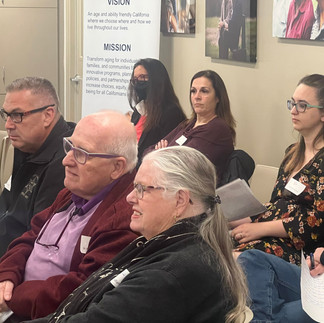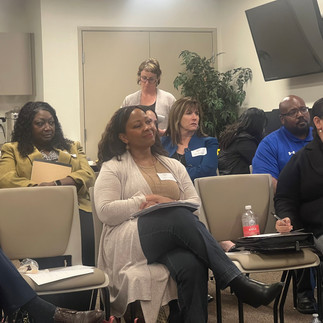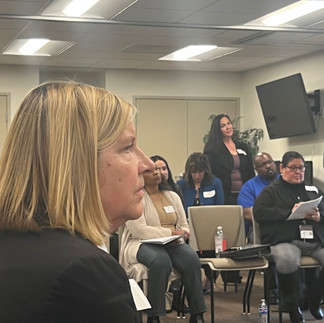Old age, more than just a number; life still exist thereafter, but senior services don't say experts
- The ONME Newswire

- Apr 6, 2023
- 11 min read
Updated: Apr 8, 2023
People are living longer these days; a more transparent discussion about aging can diminish older ethnic adults from living and dying alone
By Julia Dudley Najieb -- ONME News
Inevitably, we all get older each, day, each year ... but there comes a time in each of our lives where we reach that tier of "older age" that requires a discussion with our adult children or other family members, perhaps a difficult conversation to have, but much needed.
According to Our Bodies Our Selves Today, a collaboration of the Center for Women’s Health and Human Rights at Suffolk University and the nonprofit organization, Our Bodies Ourselves, stated, "In the United States, we’re living through a major demographic shift, in which 10,000 baby boomers turn 65 each day. By 2030, one-quarter of the U.S. population will be over 65, with similar shifts happening all over the world."
The website reference continued to note that our society is not prepared for this aging of the population and the opportunities and challenges it will bring.

In an Older Adult Behavioral Health Central Valley Roundtable held last week in Fresno, Calif., Inclusion & Equity, Not Isolation Is a Priority Goal of California’s Master Plan for Aging, the candid discussion was meant to be the first of many discussions throughout California. Community partners discussed, listened, and learned about the challenges around older adult behavioral health.
Because the COVID-19 pandemic has had a devastating emotional impact on older adults and their families – compounded by historic racial injustice and health inequities, California leaders are now eager to hear directly from older adults and communities of color about their well-being. They are extremely concerned about data that suggests older adults (65+) are the least likely to report receiving mental health care (21 percent) compared to all other age groups.
According to Common Wealth Fund news article, Mental Health Experiences of Older Black and Latinx Adults in the U.S. Health System, Black and Latinx adults make up less than 20 percent of Medicare enrollees and often experience racism and a lack of respect in the health system, which can deter them from seeking mental health care. Racism itself has negative mental health impacts, including stress, anxiety, and depression, and racism in health care can lead to misdiagnoses as well as adverse physical health outcomes, including greater morbidity and mortality from chronic diseases. The news article continued, a recent Commonwealth Fund analysis found that older adults who reported feeling discriminated against when seeking health care are disproportionately people of color and are nearly twice as likely to report having a mental health diagnosis such as depression or anxiety than those who have not been discriminated against.
Speaker expert, Janice Mathurin, operations manager at West Fresno Health Care

Coalition, Inc., represented West Fresno Family Resource Center, which has served the culturally diverse Southwest Fresno community since 2001. She talked about the services they provide, addressing health disparity issues impacting the culturally diverse community, providing specific, free services and resources for its residents who are often overlooked in mainstream; Yolanda Randles is the executive director. The accredited resource center has served as an internship opportunity for local college students in the area, helping them learn more about working with culturally diverse populations.
Mathurin said due to COVID-19's halt on normal business operations, the resource center had not been able to have a senior symposium for the community like it had in the past. "Wellness Wednesday" was one of the positive activities that was disbanded during the pandemic.
"Since COVID, so many of our seniors have been isolated," said Mathurin. "The seniors have now become used to the isolation--but that's not good for their mental health."
By starting with the walking group and addressing issues dealing with health among seniors, is one of the ways they have begun to reconnect. They started a social hour with coffee and tea to reconnect with seniors.
Michaelynn Lewis, also representing the West Fresno Family Resource Center, said before COVID-19, everyone was certainly isolated. She said that after surveying older adults about what was most important post-pandemic, it was about reconnecting.
Detective Larry "Skip" Swain, Elder Abuse Unit, Fresno County Sheriff's Office who has been a cop for the last almost 31 years, lead detective for the last 13 years in the Elder Abuse Unit, expressed his concerns as he has witnessed diminishing family involvement with older family members. Whether it be the multiple calls about a prowler in the house from a lady who can't live by herself anymore to the stubbornness of an older person not wanting to get assistance, he shared a lot of the same frustrations, he said, when approaching victims who may have trauma, stress or other issues affecting their mental health.
"We're cops, we are not doctors," said Detective Swain. "Can I say that what this person is experiencing is a cognitive disorder? Or, can I say it's a mental health disorder? Or, can I say, 'Maybe this lady just has a UTI, and it's mirroring this because three days later she is going to be clear as a bell'?..."
"So, we have a hard time with that, and we have a hard time getting providers listening to us. When we put somebody on a mental health hold, it's because we have zero other ways to do it."
Detective Swain attempts to use cognitive screening tools, but often gets resistance from victims. He said that the "51/51" band-aid approach is the only way to get someone to a higher level of care, reiterating that it is not the best approach. These repeat-calling older-age individuals also take up lots of resources.
Moreover, another category of adults who are growing older and suffering mental anguish right in front of us--veterans.

In fact, U.S. Department of Veterans Affairs Community Engagement Program Coordinator for Suicide Prevention Derric Brown spoke to the discussion group about the alarming suicide statistic he received via email from the California Department of Public Health concerning older veterans. Brown is a licensed social worker.
"Forty-four percent of those older adults who die by suicide in California are veterans," said Brown, "...11 out of 17 veterans who die by suicide never accessed VA care. This is a public health issue with our veterans."

Although some applaud the legislation that is working at a turtle-pace to ensure the health future of aging Californians, two key elected officials are authoring and/or co-authoring bills to address many of the issues discussed in the open forum: under-trained representatives who are not culturally sensitive to their older clients; lack of diverse medical providers who look like the clients they serve; ensuring skyrocketing housing costs are not putting older adults out on the streets through eviction.
California Senator Anna M. Caballero, her representative reviewed the several bills she is authoring: SB 17 will revise the requirements of the California Tax Credit Allocation Committee’s Low-Income Housing Tax Credit to ensure that a minimum percentage of the credits allocated are for senior housing projects using census demographic data.
SB 37 creates a rent subsidy program for low-income older adults and adults with disabilities who are homeless or at risk of experiencing homelessness.
SB 657 will require the Interagency Council on Homelessness and regional Continuums of Care (COC’s) to create and provide geriatric training to their homeless service staff.
“California seniors are at great risk because of the rapid rise of the costs of housing," explained Senator Caballero.
"Most have worked their entire lives, find it difficult to manage a budget on a limited income. Seniors are estimated to be the fastest-growing group in our nation experiencing homelessness and shelters become de facto nursing homes without the special services that seniors need. This is unconscionable and needs to be a priority in the state of California.”
Medical emergency room doctor and 31st Assembly District in Fresno County in the Central Valley, Dr. Joaquin Arambula, his representative, discussed how the elected official is very concerned about the challenges older adults face in the Central Valley.
A couple of years ago Dr. Arambula championed Assembly Bill 4 with assembly members, Bonta, Chiu, Gipson, Lorena Gonzalez, Reyes, and Santiago, coauthored by Senators Caballero, Durazo, and Wiener. Older adults, 50 and older, can now apply for Medi-Cal, regardless of immigration status. As of today (2023), 310,000+ seniors over the age of 50 have enrolled in full scope Medi-Cal.
His next legislation is focused on having an adequate number of medical providers who are culturally diverse and sensitive to the older population.
An ethno-geriatric education and wellness center was suggested by expert, Ms. Erica

Jones, who was formerly employed by the UCSF Alzheimer and Memory Center. Using the Central Valley as a unique epicenter, Jones said this center would be the learning ground for clinicians (doctors, psychiatrists, psychologist, etc.) and key resources: linguistic services, culturally congruent services, ableism services, LGBTQ+ services and other resources for senior.
"It can start out in a little room," said Jones. "In fact, that's how Stanford started out, and now it's a really big center."
Jones expressed the need for clinicians to learn about cultural respect, the subtle things that matter when developing relationships with seniors under care to enhance cultural understanding.
Lewis gave the perfect example of this when she took her mother to go see a doctor.
"We were in a doctor's office one day, and they were calling her 'honey, and hon,' and that kind of thing," explained Lewis. "Finally, she would not respond. Finally I said, 'Call her Mrs. Lewis.' The minute I said 'Mrs. Lewis,' she told them everything they needed to know."
"When you think about African-American culture, and how we were raised, and how things came about, a lot of people didn't get the respect--no matter what their titles were, they were 'girl, boy' things like that --they have earned the right to become 'Mr., Mrs.' with that type of senior respect."
On the other hand, Brian Poth, the executive director and co-founder of The Source LGBT+ Center which serves Tulare, Kings and Fresno counties, said that the older members of the LGBTQ community do not want to be called "Mr." or "Mrs." because it would be considered an insult to misgender a person.
"You can't assume that somebody's partner is the opposite sex, said Poth. "Often times in the LGBTQ community, that can be disrespectful because you can misgender someone accidentally."
Ironically, his center, which provides 30+ programs, does not currently offer senior services; they still get the calls because there are currently no services catered to seniors from the LGBTQ+ community. Poth said the isolation can get really bad for LGBTQ seniors, especially when their partners die, and there is no extended family to help them.
Dr. William Dailey, Jr., former human services professor at Fresno City College who retired in 2020, said there is a lot of constant education that has to be given to people in general as how to address older adults--he does not like the use of the word "elderly," nor does he like his wife being called, "honey."
"When you say elderly, you think of the frail, and those who can't do anything," said Dr. Dailey. "Well, many of us are not elderly, we are older adults, and we still function, and we still produce in our society--so change the words."
Dr. Dailey also shared his personal story, as he is now the caregiver for his wife, who is now on hospice.
"COVID caused a lot of isolation; my wife is not able to be transported. If she has to be transported, it has to be by medical transport at $110.00 each way--that's one of the reasons why we went on hospice."
Because of the high prices for transportation, Dr. Dailey and his wife had to overlook some health issues concerning his wife's eyes, hearing and dental--they had to limit these visits due to the high costs.
What some people may not realize is that many seniors no longer drive; therefore, inexpensive, available transportation would only make sense. Through Handy Ride, a shared ride, curb-to-curb service, Dr. Dailey used to have to wait to get a ride home, an hour and a half after teaching all day. However, he was very pleased with a transportation service that costs less than $8.00 for both directions.
"We had a new transportation system in Fresno; it was a car service," said Dr. Dailey. "They used electric cars--it was fabulous! But the City didn't refund them, and I am livid ... because they wanted to spend their money on new buses, but they should have funded that company--it was a door-to-door service--it was the best service I ever had ... I never had to wait very long, and I only had to pay $3.00 each way."
For five years, Dr. Dailey said he has been fighting for a senior center and senior housing in the city of Fresno--it's a long process, he said. It seems that a parking situation is holding up the project, although many seniors no longer drive, according to Dr. Dailey.
"We have 95,000 seniors; we are the only city in the state that has no senior center," explained Dr. Dailey.
The discussion also lightly addressed the average caregiver, who takes on the burden as a matter of principle and duty rather than monetary gains or rewards.
In a 2020 fact sheet report, The “Typical” African American Caregiver, produced by the National Alliance for Caregiving and AARP, African-American caregivers are 47.7 years old on average. They are more often unmarried than all other racial/ethnic groups and report lower household incomes than non-Hispanic white and Asian caregivers. African American caregivers typically care for a parent, spouse, or grandparent who is 64.9 years old and has 1.7 conditions; usually a long-term physical condition. About half the time the recipient lives in the African American caregiver’s home; more commonly than non-Hispanic whites. African American caregivers report experiencing 2.4 financial impacts as a result of providing care—more than either non-Hispanic white or Asian caregivers—most commonly stopping saving, leaving bills unpaid or paying them late, or taking on more debt. Thus a reason to have discussion part two about aging in California -- community leaders realized that the public and private sectors are going to have to work together to develop solutions to support family caregivers and those under their care.
California Older Adult Behavioral Health Resources
Under the umbrella of the California Health and Human Services Agency, the California Department of Aging (CDA) administers programs that serve older adults, adults with disabilities, family caregivers, and residents in long-term care facilities throughout the State. These programs are funded through the federal Older Americans Act, the Older Californians Act, and through the Medi-Cal program.
The Department contracts with the network of 33 Area Agencies on Aging, who directly manage a wide array of federal and state-funded services that provide meals, help finding employment; supportive services to assist older individuals as well as younger adults with disabilities to live as independently as possible; promote healthy aging and community involvement; and support family members in their vital care giving role.
CDA also contracts with 38 agencies that operate the Multipurpose Senior Services Program through the Medi-Cal home and community-based waiver for the elderly and certifies approximately 242 Adult Day Health Care Centers for participation in the Medi-Cal Community Based Adult Services (CBAS) Program. Below is a listing of some of the resources available.
California State Resources
Friendship Line California - A free, 24-hour crisis intervention hotline and a warm line for non-emergency emotional support calls for older adults.
Seniors and Mental/Behavioral Health - A compilation of programs and resources to support the work of California’s 59 local mental health and behavioral health boards and commissions.
California Behavioral Health Planning Council
UCLA Center for Health Policy Research
o California Mental Health Older Adult System of Care Project - A series of issue
briefs focused on California’s behavioral health system of care for older adults.
California Department of Public Health
o Older Adult Suicide in California, 2018 - Fact sheet summarizing older adult
suicide data from vital statistics records and the California Violent Death
Reporting System.
Examples of Behavioral Health Programs Serving Older Adults
AgeWise -A San Bernardino County Full Service Partnership (FSP) providing behavioral health and case management program for older adults with serious mental illness or severe emotional disturbance.
Program to Encourage Active and Rewarding Lives (PEARLS)- University of Washington. PEARLS is a home and community-based intervention that aims to reduce depression.
Check in With You: The Older Adult Hopelessness Screening Program - Tulare County partnership between primary care and behavioral health providers to provide early intervention behavioral services to older adults.
The Community Gatekeeper Training: Lesbian, Gay, Bisexual, Transgender (LGBTQ) Older Adults Alameda County program that trains gatekeepers to recognize when LGBTQ older adults may be at risk for suicide and respond appropriately.
Federal Resources
Administration for Community Living - Behavioral Health Resources
Centers for Disease Control and Prevention- Depression is Not a Normal Part of Growing Older
National Institute of Mental Health - Older Adults and Mental Health
Substance Abuse and Mental Health Services Administration (SAMHSA) - Resources for Older Adults
SAMHSA - Suicide Prevention Resource Center
WATCH FULL VIDEO BELOW


























Comments